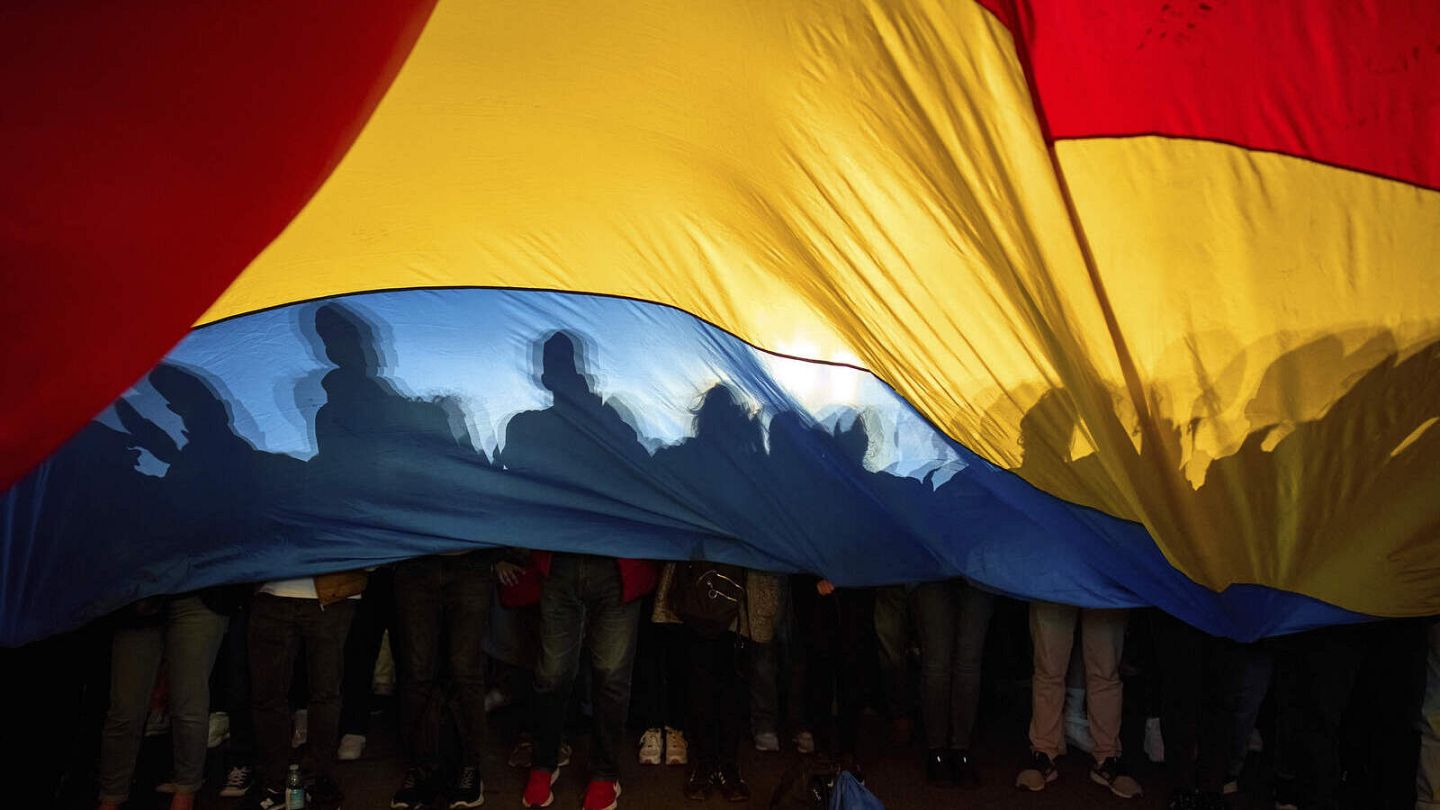Romania grapples with disinformation ahead of tense presidential run-off
Analysts say disinformation actors continue to sow division and distrust ahead of a consequential presidential second round on Sunday.
Romanians continue to grapple with a deluge of disinformation as they prepare to head to the ballots on Sunday in a presidential run-off set to go down to the wire.A recent survey suggests the vote is on a knife edge between Eurosceptic ultra-nationalist George Simion — who won a commanding first-round victory earlier this month — and pro-EU centrist Nicușor Dan.The presidential election was initially held last November but annulled when declassified Romanian intelligence alleged that a "state actor" had coordinated a TikTok campaign for first-round winner Călin Georgescu, a little-known outsider with extreme views.Georgescu was barred from the re-run, sparking outrage among his supporters at home and abroad.Experts are now warning that the second attempt at the election remains vulnerable to foreign-sponsored disinformation campaigns that aim to sow distrust and division.Analysts at defence tech company Open Minds say that almost a quarter of Romanian networks on the Telegram messaging app are "closely linked to Russian pro-Kremlin media" that disseminate misleading or false narratives about the vote.They describe these as "conduit" channels that aim to amplify Russian propaganda and state-sponsored content in both Romanian and English. OpenMinds has recorded 103 such posts per month on average since 2022.While Telegram is not widely used among Romanians, it is used to mobilise "hardline" voters and as a springboard for campaigns on other platforms. According to Romanian intelligence services, Georgescu’s TikTok campaign in November was coordinated by a Telegram group which shared advice on how to mislead the Chinese-owned platform’s content verification systems.The predominant narratives circulating online ahead of Sunday’s vote include vague accusations of crimes committed by the Romanian government against its citizens, unfounded allegations of "massive electoral fraud" or claims Sunday’s vote had already been cancelled.Speaking to Euroverify, Dr Madalina Botan, associate professor at the National University of Political Science and Administration, said disinformation narratives risk deepening voter apathy and distrust.“There is a very low trust in institutions in Romania — it’s an achilles heel. So when you have allegations that the elections have been rigged or will be rigged, then it's very easy to build on that, to amplify public mistrust,” she explained.“We share borders with Ukraine and Moldova, and being on the EU's eastern flank makes us a frontline state in Russian disinformation and warfare strategies. So that makes us particularly vulnerable,” Botan added.Simion, the leader of the hard-right Alliance for the Union of Romanians who has been polling ahead of his rival in recent weeks, has threatened to withdraw Romanian support for Ukraine until it "respects the rights" of the minority ethnic Romanians living in its territory.He is currently barred from entering Ukraine or Moldova over what Ukraine's Security Services have described as "systematic anti-Ukrainian activities."Both opposing campaigns have accused each other of disinformation actions.Euroverify detects persistent disinformation on TikTokEuroverify detected instances of electoral disinformation circulating on TikTok, the Chinese-owned company at the heart of the controversy that led to the annulment of the first iteration of the election, in the run-up to Sunday’s vote.They included unfounded claims of “massive” electoral fraud, such as that the diaspora votes would be doubled to skew the vote in favour of pro-EU candidate Nicușor Dan, or that as many as two million deceased people had been kept on the electoral lists, a claim Romania’s Interior Ministry has already refuted.We also detected unfounded claims that the election will be cancelled again, despite there being no evidence to support this. Romanian fact-checkers say the claim was first made on a sanctioned pro-Kremlin publication, and is intended to suppress the vote.TikTok is currently being probed by the European Commission in relation to its role in boosting Georgescu’s campaign ahead of the first iteration of the vote last November.The European Commissioner for technology, Henna Virkkunen, recently said TikTok has made “internal changes,” including “better detection and labelling of political accounts and more Romanian language experts” ahead of the re-run.Yet a study unveiled Thursday by non-profit Global Witness said TikTok’s algorithm was pushing nearly three times more far-right content to “new, politically-balanced users” than any other political content.Global Witness says their study demonstrates TikTok’s failures in preventing the platform from “prioritising far-right content,” saying it could be compromising the integrity of the election yet again.In a report released earlier this week that details evidence of “algorithm manipulation and instrumentalisation of influencers” on TikTok during the first iteration of the vote, the French cyber agency warns that European nations such as France are vulnerable to similar state-backed campaigns during future elections.


